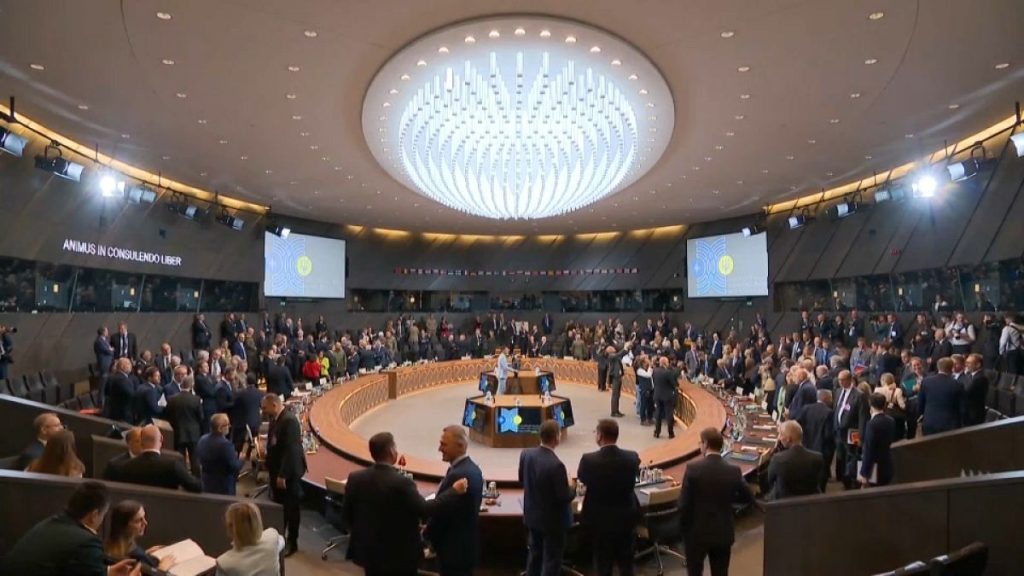Ministers gathered at NATO headquarters in Brussels for high-level talks before an upcoming summit hosted by US President Joe Biden. NATO defense ministers agreed on a plan to provide long-term security assistance and military training to Ukraine, with Hungary promising not to veto the scheme as long as it’s not forced to take part. This support comes as Russian troops launch attacks along the front line, taking advantage of delays in US military aid and political infighting over European Union funds. NATO Secretary-General Jens Stoltenberg emphasized the need for predictability in the support Ukraine receives, pledging to sustain the current level of military assistance for as long as needed.
Since Russia’s full-scale invasion in February 2022, Ukraine’s Western allies have been meeting regularly to provide weapons and ammunition through the Ukraine Defence Contact Group. While this support has been significant, it has been ad-hoc and unpredictable. Stoltenberg has advocated for NATO to take on a more active role in coordinating security assistance and training for Ukraine. The military alliance aims to use its command structure and common budget to streamline the support process, ensuring consistency and reliability in the aid provided to Ukraine. Stoltenberg is hopeful that Biden and other NATO leaders will agree to maintain the funding level for military support, estimated at around €40 billion worth of equipment annually, during the upcoming summit in Washington.
The ongoing conflict in Ukraine has spurred NATO to increase its support for the country’s armed forces, as they confront Russian aggression along the front line. NATO’s plan to provide long-term security assistance and military training to Ukraine reflects a commitment to bolstering Ukraine’s defense capabilities and ensuring its ability to withstand Russian incursions. By coordinating support through NATO’s structures and funding mechanisms, the alliance aims to provide Ukraine with the necessary resources and training to effectively defend its territory and deter further Russian aggression. Stoltenberg’s proposal to sustain the current level of military support underscores the importance of ongoing assistance to Ukraine in the face of continued threats from Russia.
The Biden administration has been a key player in rallying NATO allies to provide support to Ukraine in response to Russia’s invasion. The upcoming summit in Washington will provide an opportunity for Biden and other NATO leaders to reaffirm their commitment to Ukraine’s security and discuss how best to continue supporting the country in the face of ongoing Russian aggression. By maintaining the current level of military support and streamlining the process through NATO coordination, the alliance aims to ensure that Ukraine has the resources and training necessary to defend itself effectively against Russian threats.
The situation in Ukraine remains precarious, with Russian troops conducting attacks along the front line and exploiting delays in military aid from the US and political infighting within the European Union. NATO’s plan to provide long-term security assistance and training to Ukraine aims to address these challenges by ensuring predictability and reliability in the support that Ukraine receives. By coordinating support through NATO structures and using the alliance’s common budget, NATO seeks to streamline the assistance process and provide Ukraine with the necessary resources to defend its territory and deter further Russian aggression.
As Ukraine’s Western allies come together to provide support through NATO, the focus is on ensuring that Ukraine has the tools and training it needs to confront Russian aggression effectively. By sustaining the current level of military support and coordinating assistance through NATO, the alliance aims to bolster Ukraine’s defense capabilities and enhance its ability to withstand ongoing threats from Russia. The commitment of NATO defense ministers to providing long-term security assistance to Ukraine underscores the alliance’s solidarity with the country and its determination to support Ukraine in the face of continued challenges posed by Russian aggression.












